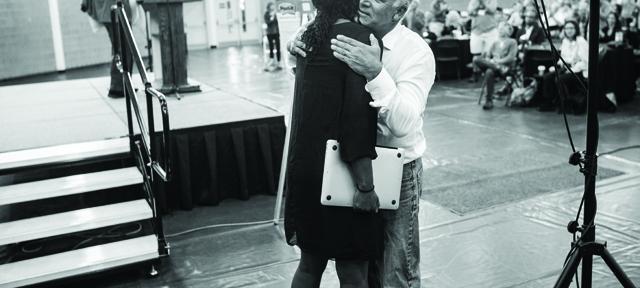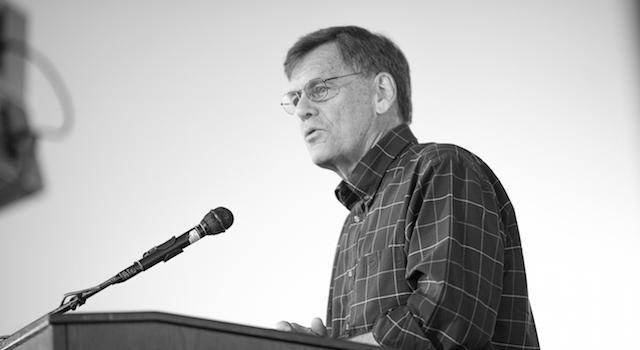A Day To Learn, To Educate, To Influence

Part Three of Three Selections of Speeches From The Kern Center Dedication on September 16
"Nothing Held Them Back" by Sarah Hews
I came to Hampshire because I wanted to push the bounds of education. I never dreamed that Hampshire would also push the bounds of sustainability. The Kern Center fills me with pride and highlights the power to teach sustainability, to transform perspectives, to connect over shared values.
A year and a half ago, Christina Cianfrani and I started designing the Integrated Sciences first-year program. Chris suggested we use the Kern Center as our classroom and lab. We didn’t know much about living buildings (I knew nothing), and the Kern Center was not yet built. But we heeded the advice we always give students: Just go for it. I taught “Modeling Systems,” Chris taught a water course, and Jason Tor taught microbiology. Each week we brought our students together to complete collaborative interdisciplinary labs. We toured the building during its construction, and the architects and engineers were happy to share what was, and still is, unknown about how the building would operate. We ran experiments in it and on it. Learning in this way led our students to asking incredibly complex questions. Asking questions is the cornerstone of our curriculum, and in the Kern Center we didn’t even have to teach it.
Nothing held them back. That’s why, last June, we decided to bring seven students to a national engineering conference in Knoxville, where they competed to design a storm-water fi er. They ended up winning that challenge . . . against teams made up of all graduate students. They were first-years, and they didn’t blink. They weren’t even all that surprised that they had won, and neither were we faculty. We saw how they had developed through the Kern Center such incredible confidence that changed their perspective of learning.
Sarah Hews is an assistant professor of mathematics in the School of Natural Science. In her teaching she applies mathematical techniques to biological and physical systems to understand the concepts and computational tools necessary to tackle complex, real-world problems.
"The Experiment Is Over" by Gary Hirshberg 72F
I see the Kern Center as more than a structure or a place. For me it represents the most essential ingredient to make sustainability possible: thinking differently. (And where else but Hampshire?) We’re the only species on earth that’s in the practice of leaving stuff behind that’s toxic and destructive to others. This building, and the thinking behind it, challenges the concept of away — that mythological place where we send all of our waste. I’m still trying to figure out where away is. If you find it, let me know.
This building also challenges the myth that green means sacrifice.
We now know that reducing footprints — carbon footprints, water footprints, toxin footprints, biodiversity footprints, the poverty footprint as 10 percent of the world uses more than half our resources and the most vulnerable pay the price — that reducing these footprints actually does raise all boats. Climate is not an opportunity to think about deficits. It’s an opportunity to think about what we can have if we understand that we’re the subsidiary of our earth, and not the opposite, as we’ve thought.
The Kern Center makes me realize, too, that it is not only a living, breathing building but also a living, breathing educational institution opportunity. Despite all of the incredible elements in this structure, the most exciting to me is the inextricable involvement of students in every step of the process — from design, through building, through modeling, through improving. This process is what’s greatest for me because what’s now needed in the world is not more talk about sustainability, but training and tools. We have the knowledge of the problem. We have the motivation. (I have three millennial children, and this is where they’ve chosen to put their efforts. And you see it all around this campus, whether it’s environmental justice or ecology or ecosystem protection.)
But what we now need is student involvement at every step, to train and inspire and equip the next generation to go forward and make this a real part of our economics. Sustainability is not a topic. It’s a fully integrated way of thinking — absolutely coincident with everything about Hampshire, everything that we who have been here know and love.
I think this is a moment in history, but also a moment in the history of this College. We have an extraordinary opportunity, inside our community and out in the world, to challenge siloed thinking and, with our students and faculty, model the way we need to think differently to raise all boats. To my mind, the Hampshire “experiment” is over. In my day we never knew if the school was going to even be here the next year, when we came back from break. We now know that it is. We see it in our alums. We see it in the expression of this building.
This is our moment. We have the luxury of choice in a world where many do not have choice. We have the knowledge and the experience. And we are now getting the tools. This means we have the responsibility to share this incredible learning experience. None of us wins unless all of us win. To me, this day is about hope. I don’t believe we have a shortage of anything as long as we have hope — and this is one of the most hopeful moments in the College’s history, and in a world in dire need of solutions.
Gary Hirshberg 72F is chairman of Stonyfield Farm and a corporate and environmental leader. In 2012 he helped Hampshire launch its initiative to integrate food, operations, and curriculum to build a campus-wide culture of sustainability.
From the Fall 2016 issue of Hampshire's Non Satis Scire magazine.



